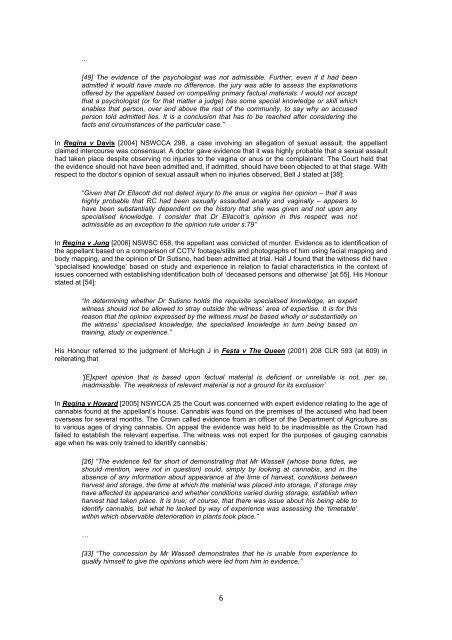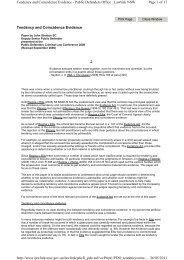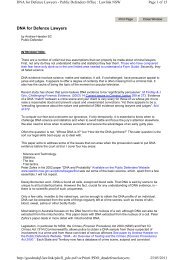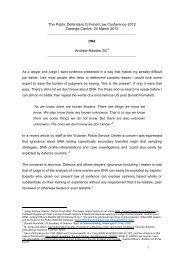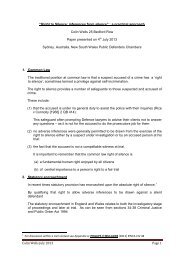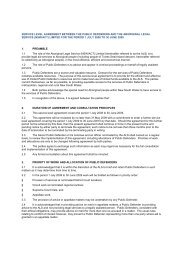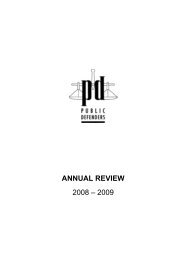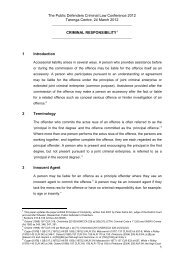Expert Evidence, by Dina Yehia SC - The Public Defenders
Expert Evidence, by Dina Yehia SC - The Public Defenders
Expert Evidence, by Dina Yehia SC - The Public Defenders
Create successful ePaper yourself
Turn your PDF publications into a flip-book with our unique Google optimized e-Paper software.
...<br />
[49] <strong>The</strong> evidence of the psychologist was not admissible. Further, even if it had been<br />
admitted it would have made no difference, the jury was able to assess the explanations<br />
offered <strong>by</strong> the appellant based on compelling primary factual materials. I would not accept<br />
that a psychologist (or for that matter a judge) has some special knowledge or skill which<br />
enables that person, over and above the rest of the community, to say why an accused<br />
person told admitted lies. It is a conclusion that has to be reached after considering the<br />
facts and circumstances of the particular case.”<br />
In Regina v Davis [2004] NSWCCA 298, a case involving an allegation of sexual assault, the appellant<br />
claimed intercourse was consensual. A doctor gave evidence that it was highly probable that a sexual assault<br />
had taken place despite observing no injuries to the vagina or anus or the complainant. <strong>The</strong> Court held that<br />
the evidence should not have been admitted and, if admitted, should have been objected to at that stage. With<br />
respect to the doctor’s opinion of sexual assault when no injuries observed, Bell J stated at [38]:<br />
“Given that Dr Ellacott did not detect injury to the anus or vagina her opinion – that it was<br />
highly probable that RC had been sexually assaulted anally and vaginally – appears to<br />
have been substantially dependent on the history that she was given and not upon any<br />
specialised knowledge. I consider that Dr Ellacott’s opinion in this respect was not<br />
admissible as an exception to the opinion rule under s.79”<br />
In Regina v Jung [2006] NSW<strong>SC</strong> 658, the appellant was convicted of murder. <strong>Evidence</strong> as to identification of<br />
the appellant based on a comparison of CCTV footage/stills and photographs of him using facial mapping and<br />
body mapping, and the opinion of Dr Sutisno, had been admitted at trial. Hall J found that the witness did have<br />
‘specialised knowledge’ based on study and experience in relation to facial characteristics in the context of<br />
issues concerned with establishing identification both of ‘deceased persons and otherwise’ [at 55]. His Honour<br />
stated at [54]:<br />
“In determining whether Dr Sutisno holds the requisite specialised knowledge, an expert<br />
witness should not be allowed to stray outside the witness’ area of expertise. It is for this<br />
reason that the opinion expressed <strong>by</strong> the witness must be based wholly or substantially on<br />
the witness’ specialised knowledge, the specialised knowledge in turn being based on<br />
training, study or experience.”<br />
His Honour referred to the judgment of McHugh J in Festa v <strong>The</strong> Queen (2001) 208 CLR 593 (at 609) in<br />
reiterating that<br />
‘[E]xpert opinion that is based upon factual material is deficient or unreliable is not, per se,<br />
inadmissible. <strong>The</strong> weakness of relevant material is not a ground for its exclusion’<br />
In Regina v Howard [2005] NSWCCA 25 the Court was concerned with expert evidence relating to the age of<br />
cannabis found at the appellant’s house. Cannabis was found on the premises of the accused who had been<br />
overseas for several months. <strong>The</strong> Crown called evidence from an officer of the Department of Agriculture as<br />
to various ages of drying cannabis. On appeal the evidence was held to be inadmissible as the Crown had<br />
failed to establish the relevant expertise. <strong>The</strong> witness was not expert for the purposes of gauging cannabis<br />
age when he was only trained to identify cannabis:<br />
[26] “<strong>The</strong> evidence fell far short of demonstrating that Mr Wassell (whose bona fides, we<br />
should mention, were not in question) could, simply <strong>by</strong> looking at cannabis, and in the<br />
absence of any information about appearance at the time of harvest, conditions between<br />
harvest and storage, the time at which the material was placed into storage, if storage may<br />
have affected its appearance and whether conditions varied during storage, establish when<br />
harvest had taken place. It is true; of course, that there was issue about his being able to<br />
identify cannabis, but what he lacked <strong>by</strong> way of experience was assessing the ‘timetable’<br />
within which observable deterioration in plants took place.”<br />
…<br />
[33] “<strong>The</strong> concession <strong>by</strong> Mr Wassell demonstrates that he is unable from experience to<br />
qualify himself to give the opinions which were led from him in evidence.”<br />
6


